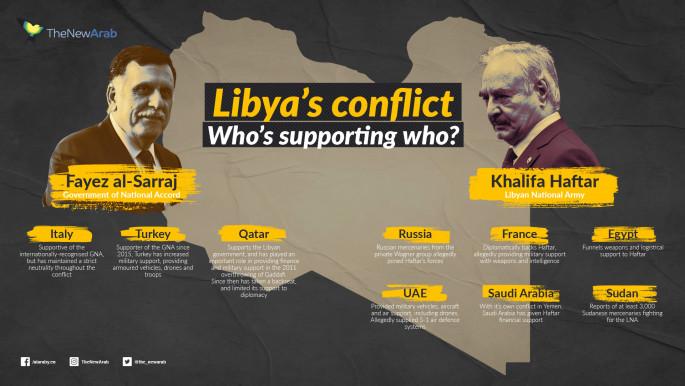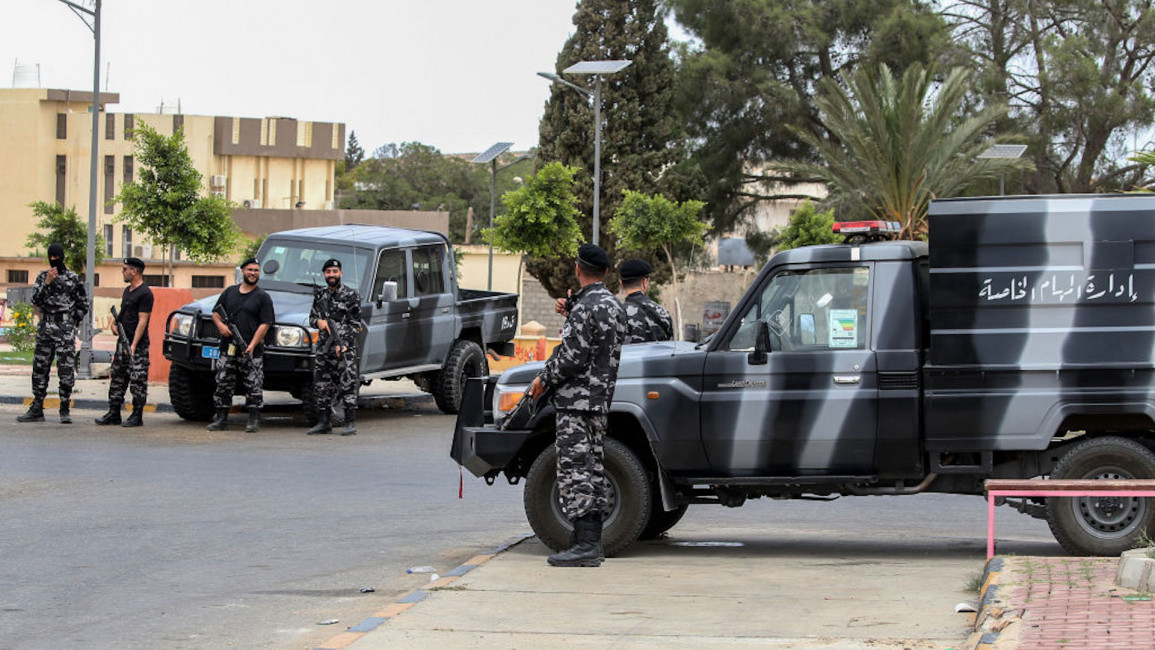US sends AFRICOM officials to meet Libya government after Egypt 'declaration of war'
Pro-GNA media outlets cited insider sources saying the AFRICOM officials landed in the Libyan city of Zuwara to meet with representatives of Libya's UN-recognised GNA, including Sarraj, over recent tensions with Egypt.
The meeting comes after the GNA denounced Egypt's warning of military intervention in Libya, perceiving the remarks as a "declaration of war".
"This is a hostile act, direct interference and amounts to a declaration of war," the GNA said in a statement in response to Sisi's comments over the weekend.
The US has also voiced its opposition to military escalation in Libya, calling for a ceasefire. The US National Security Council (NSC) said on Monday that parties should negotiate, according to tweets via its official account.
|
"The United States strongly opposes military escalation in Libya – on all sides. We urge parties to commit to a ceasefire and resume negotiations immediately. We must build on progress made through the UN’s 5+5 talks, the Cairo Initiative, and the Berlin process," the NSC said.
Sisi's war of words came on Saturday, on the eve of a virtual meeting of Arab League foreign ministers on Libya, in which the GNA declined to participate. That meeting, which had originally been scheduled for Monday, has been pushed back to Tuesday.
The Egyptian president warned that if pro-GNA forces advanced on the strategic city of Sirte – some 450 kilometres east of Tripoli – and the Jufra base, it could provoke a "direct" intervention by Cairo.
The GNA is also advancing to capture oil fields in the south from the Egypt-backed forces of renegade commander Khalifa Haftar.
For the Libyan state, "interference in its internal affairs, attacks on its sovereignty, whether by declarations... like those of the Egyptian president or by support for putschists, militias and mercenaries, is unacceptable," the GNA said in its statement.
The GNA called on the international community to "assume its responsibilities with regard to this escalation".
It said it was open to "all impartial mediation... under the aegis of the UN" but rejected "unilateral or extrajudicial initiatives".
Oil-rich Libya has been torn by violence, drawing in tribal militias, jihadists and mercenaries since the 2011 toppling and killing of longtime dictator Muammar Gaddafi in a Western-backed uprising.
Since 2015, a power struggle has pitted the Tripoli-based GNA against Haftar, who claims legitimacy from an eastern-based elected parliament.
Haftar has been trying unsuccessfully to seize the capital since April 2019, with support from neighbouring Egypt, Russia and the United Arab Emirates.
Read also: Saudi Arabia, UAE 'support' Egypt's threat of military intervention in Libya
Since the start of June, increased Turkish support has enabled pro-GNA forces to take control of northwest Libya, ending Haftar's assault on Tripoli.
 |
The GNA advance is now halted outside the coastal city of Sirte, a strategic access point to Libya's key oil fields which remains under Haftar's control.
If this line is crossed, Egyptian forces will directly intervene in Libya, Sisi said.
"All of Libya is a red line," the GNA responded. "Whatever the dispute between Libyans, we will not allow our people to be insulted or threatened."
But the speaker of Libya's eastern-based parliament Aguila Saleh defended Sisi's declaration, saying in a Sunday statement that the Egyptian president was "responding to our appeal to the Egyptian parliament" last January in which Saleh called for Egyptian intervention in Libya.
And on Sunday the Jordanian foreign ministry issued a statement saying Amman supports Cairo "against any threat to the security and stability" of Egypt.
It came after the foreign ministers of both countries discussed the Libya conflict over the phone.
What would an Egyptian intervention in Libya look like?
Egypt has said that the Turkish-backed GNA's capturing of the strategic city of Sirte and other oil-rich regions would be a 'red line' prompting direct military confrontation.
|
Egyptian officials who spoke to The New Arab's Arabic edition on condition of anonymity all concluded that ground forces will not be involved in any intervention.
While a direct military intervention is unlikely due to associated high costs and logistical difficulties among other factors, sources said Egypt would resume air strikes on advancing forces.
Egyptian air strikes to deter advancements of GNA forces are not unprecedented, and Cairo has been suspected of using French-made Rafale fighter jets in previous incidents.
After Haftar's forces suffered losses against GNA forces in recent weeks, the UAE has increasingly pressured Sisi to deploy more effective forces, the sources claimed.
The sources suggest Egypt's ultimate goal – whether or not the threats are followed by an intervention – is to improve its negotiating position to guarantee its interests in eastern Libya following Haftar's setbacks in the country's west. The sources did not rule out an eventual deal with Turkey in the future.
Following the footsteps of Turkey, backing the rival GNA, Egypt could also move to openly support eastern Libyan forces with arms shipments.
While Sisi's control over state institutions allows him to sort out the beauracratic hurdles, a diplomatic source said Sisi may pass a decision to deploy troops in Libya to shift the current power dynamic – without actually following through with the deployment.
Agencies contributed to this report.


![Minnesota Tim Walz is working to court Muslim voters. [Getty]](/sites/default/files/styles/image_684x385/public/2169747529.jpeg?h=a5f2f23a&itok=b63Wif2V)




![Debris near Rafic Hariri International Airport [Getty]](/sites/default/files/styles/image_330x185/public/2176162423.jpeg?h=a5f2f23a&itok=MCSK9mkM)
![An Israeli air strike on Jabalia killed teenage journalist Hassan Hamad [Screengrab/X]](/sites/default/files/styles/image_330x185/public/2024-10/hassan%20hamad1.jpg?h=c12e0b96&itok=Rd_dyCVp)
